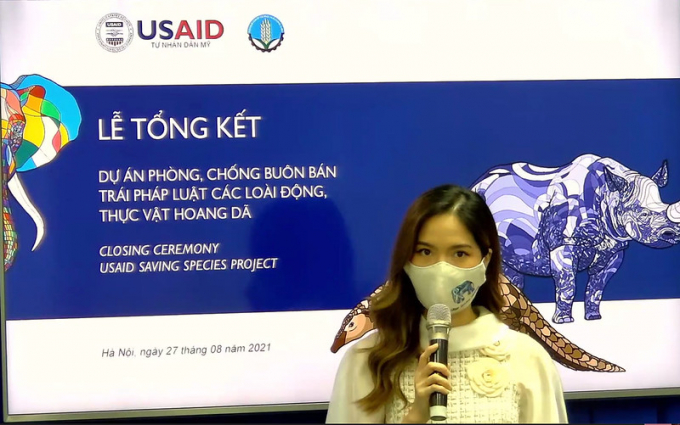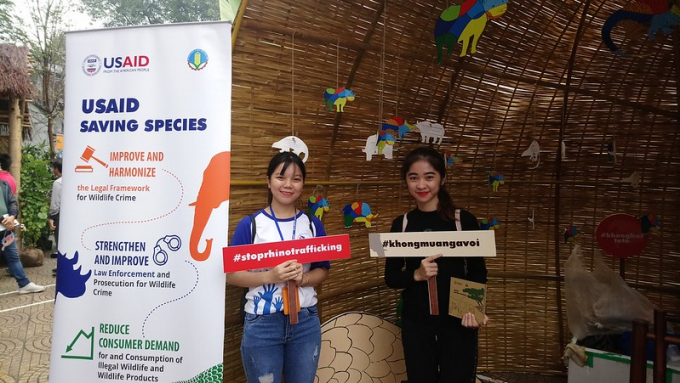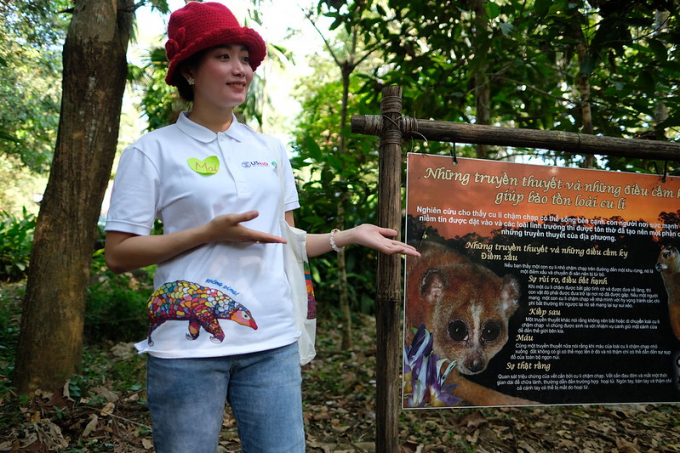June 18, 2025 | 01:54 GMT +7
June 18, 2025 | 01:54 GMT +7
Hotline: 0913.378.918
June 18, 2025 | 01:54 GMT +7
Hotline: 0913.378.918

On August 27, the United States Agency for International Development (USAID) and the Ministry of Agriculture and Rural Development (MARD) held the closing event for the USAID Saving Species project.
The virtual event was attended by delegates from ministries, state agencies, business associations, social organizations, and international organizations united in their efforts to protect Vietnam’s wildlife.
Over the past five years (2016 - 2021), the USAID Saving Species has effectively supported the government of Vietnam to improve and harmonize the legal system related to wildlife protection, strengthen law enforcement and prosecution of wildlife crimes, and reduce demand and illegal consumption of wildlife.
“USAID is proud to support Vietnam to reduce consumer demand for illegal wildlife products, build wildlife law enforcement and prosecution capacity, as well as augment and harmonize the legal framework for combating wildlife crime in Vietnam. We are very pleased to see that the cooperation between the two countries through this project has brought meaningful results. Vietnam is a critical partner of the United States for countering wildlife trafficking,” said USAID/Vietnam Mission Director Ann Marie Yastishock at the event.
Associate Professor, Dr. Le Quoc Doanh, Deputy Minister, MARD, emphasized: “The joint effort of USAID and Vietnamese government through USAID Saving Species project has contributed significantly to protect wildlife species and maintaining important eco-services to the national and regional sustainable socio-economic development”.

The USAID Saving Species project has supported the development, amendment and adoption of four important legal documents that are key to ensuring consistent management and protection of wildlife in Vietnam, resolving legal gaps and overlapping regulations. USAID Saving Species also trained more than 2,600 officials from agencies including forestry protection departments, customs officials, environmental police, wet market managers, border guards, courts, and prosecutors to help them more effectively tackle wildlife crimes. Prosecution rates for wildlife violation arrests have increased from 25% in 2018 to 75% in 2021.
In coordination with the CITES Management Authority of Vietnam, the project ran three large social behavior change communication campaigns that raised public awareness about wildlife protection legislation, targeting consumers of ivory, rhino horn and pangolin products, and encouraged traditional medicine practitioners to reduce their use of wildlife for health treatments.
These campaigns reached tens of millions of people with messages about protecting wildlife and reducing the demand for wildlife products and resulted in millions of online interactions, with significant results: A recent consumer impact survey indicated that recipients of the USAID Saving Species communications campaign messages are less likely to buy ivory, rhino horn, and pangolin products than they were prior to the campaign. Among high income earners, the percentage of buyers of ivory decreased from 16% in 2018 to 9% in 2021; and the percentage of buyers of rhino and pangolin products decreased from 8% in 2018 to 6% in 2021.

The USAID Saving Species project benefitted from its partnerships with the MARD and CITES Management Authority of Vietnam. Through subsequent projects, USAID will continue to support effective protection of wildlife and the strengthened cooperation of the two countries in wildlife crime prevention and control.
Wildlife trafficking - the poaching and illicit trade of marine and terrestrial animals - is one of USAID’s highest priority biodiversity concerns. Global wildlife crime continues to rise at exponential rates and has reached crisis levels, with a black market estimated at up to US$ 20 billion/year.
Vietnam is one of the destinations and transit countries for illegal African rhino horn, elephant ivory, and pangolin scales. Demand for wildlife in Vietnam is driven by strong cultural norms that encourage consumption of wildlife for prestige and by erroneous traditional beliefs regarding purported health benefits.
USAID Saving Species is implemented in partnership with the Vietnam CITES Management Authority of the Ministry of Agriculture and Rural Development. The Wildlife Trade Monitoring Network in Vietnam (TRAFFIC Vietnam) and the Wildlife Conservation Society (WCS) are also project partners. USAID Saving Species works with the Government of Vietnam (GVN) to:
- Reduce consumer demand for and consumption of illegal wildlife and wildlife products by targeting the behaviors, beliefs, norms, and cultural expectations of key populations that drive Vietnamese consumption of target wildlife and products.
- Strengthen wildlife law enforcement and prosecution by building the capacity of the justice sector, law enforcement and customs agents through training judiciary, police, and customs officers on countering wildlife trafficking.
- Improve and harmonize the legal framework for wildlife crime by addressing core rule of law and governance weaknesses, supporting trade compliance, and increasing clarity regarding overlapping jurisdictions, contradictory or unclear mandates, and legal loopholes.
To assist the government of Vietnam in achieving the three above objectives, USAID Saving Species will support organizations that wish to contribute to the three components through contracts, grants and cost-sharing arrangements.
Primary biodiversity targets of USAID Saving Species include: African rhinos, African and Asian elephants, and pangolins. However, project activities benefit a variety of species through general improvements in governance, law enforcement, and awareness. USAID Saving Species focuses geographically on major urban centers where target species are consumed, as well as areas where target species are trafficked, including airports, seaports, and specific land borders.
Translated by Gia Loc

(VAN) According to the Binh Thuan Department of Industry and Trade, in the first five months of 2025, Binh Thuan's dragon fruit export turnover increased by 20.65% compared to the same period last year.

(VAN) EU countries on Thursday gave final approval to new tariffs on fertilizer imports from Russia, a move aimed at cutting off revenue that could support Moscow’s war in Ukraine, despite concerns from European farmers.

(VAN) The working delegation from the Ministry of Agriculture and Environment conducted an important trip to the Netherlands to strengthen strategic partnerships and sustainable development in the agricultural sector.

(VAN) The letter ‘A Plea from the Ocean’ not only evokes emotion but also awakens the human conscience to the responsibility of protecting life on Earth.

(VAN) The Department of Agriculture in South Africa has announced the country’s first mass vaccination of poultry to prevent local birds from contracting avian influenza.

(VAN) Establishment of the Mekong Delta Regional Agricultural Linkage Center, aiming for a closed value chain, deep processing, trading platforms, and international market connectivity.

(VAN) Gia Lai province has recently recorded 460 rare species of animals and plants, contributing to forest conservation and biodiversity planning in the region.